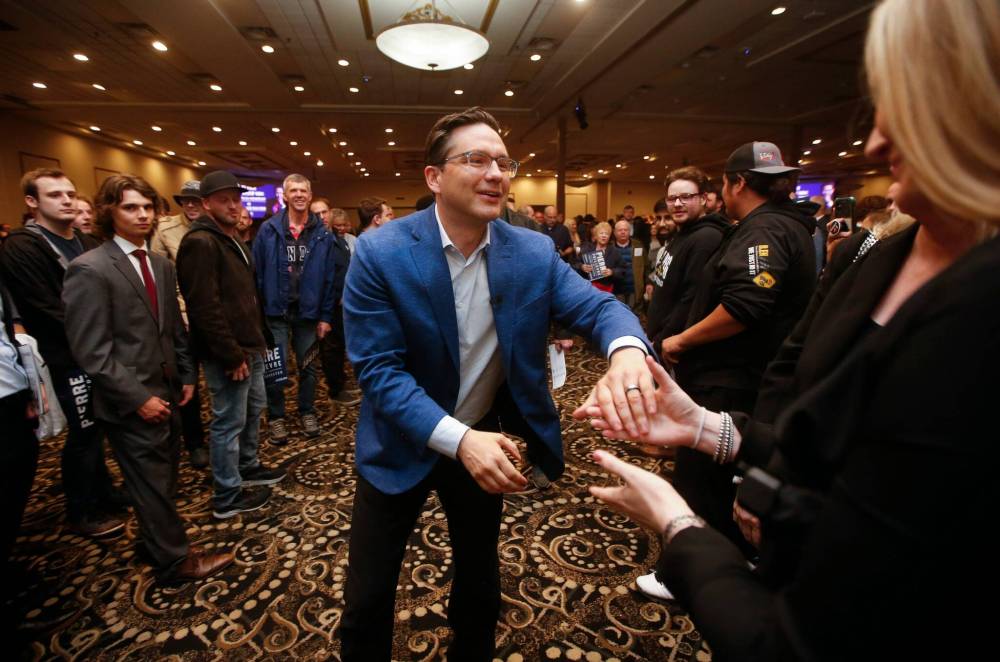Anger, suspicion fuel a political wave
Advertisement
Read this article for free:
or
Already have an account? Log in here »
To continue reading, please subscribe:
Monthly Digital Subscription
$0 for the first 4 weeks*
- Enjoy unlimited reading on winnipegfreepress.com
- Read the E-Edition, our digital replica newspaper
- Access News Break, our award-winning app
- Play interactive puzzles
*No charge for 4 weeks then price increases to the regular rate of $19.00 plus GST every four weeks. Offer available to new and qualified returning subscribers only. Cancel any time.
Monthly Digital Subscription
$4.75/week*
- Enjoy unlimited reading on winnipegfreepress.com
- Read the E-Edition, our digital replica newspaper
- Access News Break, our award-winning app
- Play interactive puzzles
*Billed as $19 plus GST every four weeks. Cancel any time.
To continue reading, please subscribe:
Add Free Press access to your Brandon Sun subscription for only an additional
$1 for the first 4 weeks*
*Your next subscription payment will increase by $1.00 and you will be charged $16.99 plus GST for four weeks. After four weeks, your payment will increase to $23.99 plus GST every four weeks.
Read unlimited articles for free today:
or
Already have an account? Log in here »
Hey there, time traveller!
This article was published 28/06/2022 (1259 days ago), so information in it may no longer be current.
It’s like suddenly realizing your country isn’t what you thought it was; that your neighbours aren’t who you thought they were.
Last month, Abacus Data asked 1,500 Canadian adults about their trust in traditional sources of information, and the extent to which they agree with theories and beliefs that continue to circulate on social media.
The results were startling. Forty-four per cent agreed that “much of the information we receive from news organizations is false.” Canada has an adult population of about 29.5 million. That means that more than 13 million adults suspect much of the news they see and hear is fake.

More than half of that same group – 52 per cent – agreed that “official government accounts of events can’t be trusted.” They don’t believe what their governments are telling them.
Forty-four per cent believe “big events like wars, recessions and the outcomes of elections are controlled by small groups of people working in secret against us.” Almost as many feel that “much of our lives are being controlled by plots hatched in secret places.”
Thirty-seven per cent (almost 11 million adult Canadians) think “there is a group of people in this country who are trying to replace native born Canadians with immigrants who agree with their political views.” One-fifth believe that “the World Economic Forum is a group of global elites with a secretive strategy to impose their ideas on the world.” Another 37 per cent think it is possibly true or aren’t sure.
But that’s not all.
Twenty-two per cent believe “secret societies control the world,” and another 31 per cent say it’s possible or aren’t sure. Thirteen per cent believe Bill Gates is using microchips to track people and affect human behaviour. Another 21 per cent say it’s possible or aren’t sure.
Nine per cent (2.7 million Canadian adults) believe it is definitely or probably true that “COVID was caused by rollout of 5G wireless technology as electromagnetic frequencies undermined immune systems.” An additional 17 per cent feel it is possibly true or aren’t sure.
Eleven per cent (3.25 million adults) think “COVID vaccines include secret chips designed to monitor and control behaviour,” while another 14 per cent think it’s possible or aren’t sure.
It gets worse.
Twenty per cent of respondents – that’s almost six million Canadians – believe the “9/11 attack was an inside job.” Eighteen per cent believe the royal family killed Princess Diana, and another 35 per cent think it is plausible.
Sixteen per cent believe “the U.S. election was stolen from Donald Trump,” while another 29 per cent think it’s possible or aren’t sure. Thirteen per cent believe “climate change is a hoax,” and another 16 per cent thinks it’s possible or are unsure.
An astounding 11 per cent (3.2 million Canadian adults!) believe “the moon landing was faked and never happened,” while another 22 per cent feel that statement is possibly true or aren’t sure.
The survey also found “belief in these theories is higher among supporters of the People’s Party” and that “those who feel Pierre Poilievre is the Conservative leadership candidate closest to their values and ideas are more likely to believe these theories.”
Focus on that last point, because many in politics and the media aren’t. They argue Poilievre has no hope of ever becoming prime minister because his message panders to an angry, suspicious splinter of Canadian voters that is too small to win an election.
They could be wrong. The flaw in their argument – exposed by Abacus – is that the group of voters they discount and disparage as “fringe” is larger than many think, and it appears to be growing. It’s well organized, well financed, and it has found its messenger in Pierre Poilievre.
He doesn’t appear to care whether those ideas, fears and suspicions are true, as long as the people holding them vote for him and donate to his campaign. And if Trump supporters are an accurate comparison, they are a fiercely loyal and determined group.
The data are real. The politics is playing out in front of our eyes. As we celebrate Canada Day later this week, we should perhaps spend some time reflecting on the kind of a country we may be becoming.
deverynrossletters@gmail.com
Twitter: @deverynross
History
Updated on Tuesday, June 28, 2022 6:23 AM CDT: Adds photo
Updated on Tuesday, June 28, 2022 8:54 AM CDT: Corrects figure to 3.2 million


